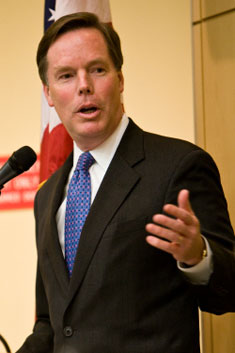No More Going It Alone
America needs to reach out to its allies—and its enemies—as foreign policy challenges mount
By Taylor McNeil

“It was self-defeating to boycott talking to governments you don’t like very much,” said R. Nicholas Burns, former undersecretary of state for political affairs, during the Fares Center conference. Photo: Alonso Nichols
If there’s one major foreign policy lesson learned in the past eight years, it’s this: going it alone doesn’t work. That’s what R. Nicholas Burns, former undersecretary of state for political affairs, told a Tufts conference on March 5.
“We can’t act alone, and we can’t isolate ourselves either from all of these extraordinary challenges as we have done too often in the past and … as we have tried without a lot of success in the first half of the present decade,” he said. “Isolationism and unilateralism are sure prescriptions for failure in our foreign policy.”
Burns gave the keynote address at the conference, “Foreign Policy Challenges for the New Administration: Iran and the Middle East.” Organized by the Fares Center for Eastern Mediterranean Studies, the two-day event featured panel discussions on topics covering the historical context of American-Iranian relations, nuclear issues in the Middle East, and war and diplomacy in the eastern Mediterranean, Iraq, the Gulf and Afghanistan, among others.
Refusing to talk with one’s enemies is another failed policy, said Burns, who retired from the State Department’s number-two position in 2008, and now is a professor of the practice of diplomacy and international politics at Harvard’s Kennedy School. He noted that when he was at the State Department and in charge of Iran policy, he was forbidden to speak with Iranian representatives.
“It’s the absence of any sustained and serious dialogue with Iran for 30 years which is an astounding state of affairs,” he said. “This is the only country of which we absolutely know nothing of their intentions and motivations and bottom-line interests.”
Burns argued that it is not in America’s interest “to know so little and be so blind. Negotiations are not a gift to an undeserving Iranian government,” he said. “Negotiations would actually put us on the offensive for the first time in many decades in the world’s most unusual diplomatic non-relationship. Negotiations would test the Iranians more than the Americans.”
Barack Obama showed “courage and foresight and foreign policy sophistication when he argued as early as 2007 … that it was self-defeating to boycott talking to governments you don’t like very much,” Burns said. “It’s sensible to engage them, not because we’re soft, not because we’re weak, but because we want to meet America’s national interest.”
Robin Wright, a conference panelist and former diplomatic correspondent for the Washington Post, noted that earlier in the day, Secretary of State Hillary Clinton had extended an invitation to Iran to participate in talks on Afghanistan at the United Nations, a move Burns applauded.
What’s needed, he said, is just that kind of multilateral talks to spark direct discussions. “I think we’re much stronger dealing with the Iranians if their principal arms exporter and co-constructor of the Bushehr nuclear power plant, Russia, is in the room,” along with China and other significant trade partners, he said.
“Within that multilateral framework, you can … have direct one-on-one meetings in some anteroom,” Burns added. It was that kind of multilateral framework that made one-on-one meetings possible with North Korea. “You had to start there. Multilateralism is the place to be.”
Obama’s Crucible
While the United States faces many foreign policy challenges, Burns said that he fears Afghanistan “will become for President Obama—not by his choice, but because it’s there—the kind of overwhelming, difficult conflict that Iraq was for President Bush.”
That’s particularly the case because effective strategies to counter the Taliban and other anti-government forces haven’t been developed, especially ones that involve the international community. “Can we create a much more effective counterinsurgency strategy that will rely less on the American military and more on the struggle, through economic aid, food assistance and the rule of law, for the hearts and minds of the Afghan people themselves in the villages of Afghanistan?” Burns suggested that it will only be possible with more coordinated international efforts.
Part of that would be dependent on American diplomatic involvement, and that’s a sticking point, given the stagnant staffing numbers at the State Department. “We have 6,500 American diplomats—that’s it,” Burns said. “We have more lawyers in the Pentagon than diplomats. We have more members of the armed forces bands than American diplomats.”
Burns notes that Obama and Clinton are arguing for a stronger State Department. “We need an ability to come in after the military does their job and to engage in rehabilitation and reconstruction in places like Afghanistan and Iraq and Kosovo—we do not have that capacity in our country right now,” he said. “So we have this extraordinary mismatch between these fundamentally capable militaries and weaker diplomatic establishments.”
That said, Burns is still optimistic about the staying power of the United States. “I think those who predict the imminent fall from grace or power of the United States are mistaken,” he said. “We will be the dominant power for decades to come; we’re still that power, and we have to have the right leadership and purpose to express that power effectively.”
Taylor McNeil can be reached at taylor.mcneil@tufts.edu.

